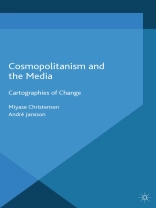Cosmopolitanism and the Media explores the diverse implications of today’s digital media environments in relation to people’s worldviews and social practices. The book presents an empirically grounded account of the relationship between cosmopolitanized lifeworlds and forces of surveillance, control and mobility.
Tabela de Conteúdo
Acknowledgements PART I: MAPPING THE TERRAIN: BOUNDARIES AND BRIDGES 1. Introductory Essay: Cosmopolitanization, Mediatization and Social Change 2. Cosmopolitan Trajectories: Connectivity, Reflexivity and Symbolic Power 3. Remediated Sociality and the Dual Logic of Surveillance PART II: CONTEXTUALIZING SPACE, MOBILITY AND BELONGING 4. Transnational Media Flows: Globalization, Politics and Identity 5. Transclusion vs. Demediation: Mediatization and the Re-Embedding of Cosmopolitanism 6. Cities, Embodied Expressivity and Morality of Proximity 7. In Conclusion: Cosmopolitanism and Its Discontents References Index
Sobre o autor
Miyase Christensen is Professor of Media and Communication Studies at Stockholm University, Sweden, and Guest Professor at the Division of History of Science, Technology and Environment at KTH Royal Institute of Technology, Sweden. She has published international books and articles on globalization processes and social change; technology, culture and identity; and politics of popular communication. One of her latest books is Media and the Politics of Arctic Climate Change: When the Ice Breaks (2013).
André Jansson is Professor of Media and Communication Studies at Karlstad University, Sweden. He has published numerous books and articles in the areas of media, globalization and identity. His recent work has appeared in New Media and Society, Communication Theory and International Journal of Cultural Studies.












